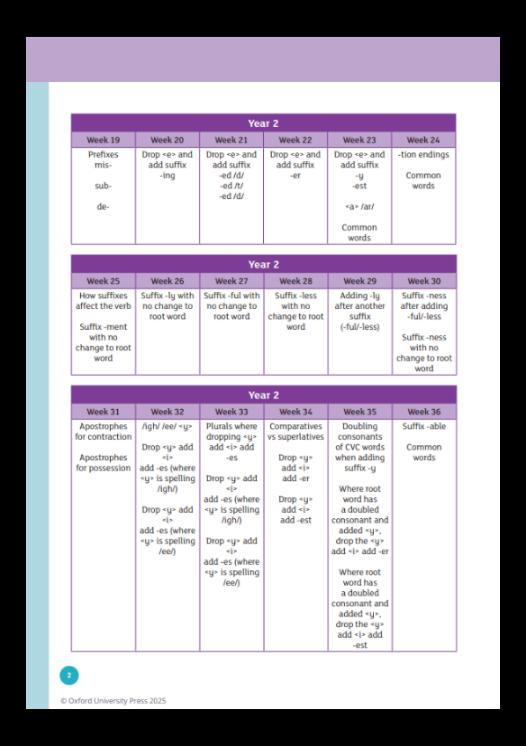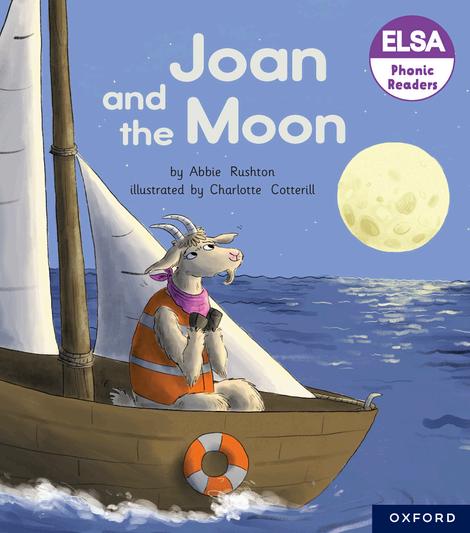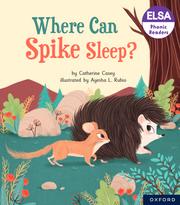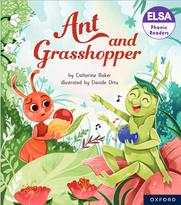Evaluation Pack

A systematic, synthetic phonics program for Foundation to Year 2


Shaping together tomorrow


A systematic, synthetic phonics program for Foundation to Year 2


Shaping together tomorrow
EssentialLettersandSoundsAustralia(ELSA)isasystematic syntheticphonicsprogramforFoundationtoYear2.Phonic progressionwithintheprogramisalignedto Letters and Sounds. ELSAisa5dayaweekprogramthatisusedfor36weeksinYearsF–2. Dailylessonsshouldtakebetween35-45minutes.
The principles of ELSA are based on:
The delivery of whole-class, high-quality explicit teaching with highly structured daily lesson plans
The use of consistent terminology by teachers, students and parents
The use of consistent resources that support effective teaching
Repetition and reinforcement of learning
Regular and manageable assessment to ensure that all students “keep up” rather than “catch up”
The consistent structure, use of terminology and resources in ELSA reduce students’ cognitive load during learning, allowing focus on new content and maximising reading success.
ELSA is based on a highly researched, evidence-based program with proven impact. We have adapted this series to support the needs of Australian schools and teachers and with complete alignment to all state curriculums.

Karina Stocker


Karina is an experienced classroom teacher, school leader, and literacy consultant She is currently working as an instructional coach at a Victorian primary school Karina is passionate about the use of evidence-based literacy instruction and positive behaviour support practices in Australian schools She has a particular interest in implementing MultiTiered Systems of Support (MTSS) to ensure equitable access to effective instruction and intervention, so all students can succeed. Karina is currently a PhD candidate at Monash University, researching the implementation of learning sciences within an MTSS framework to support improved reading outcomes in Australian schools.


Dr Nathaniel Swain is a Teacher, Instructional Coach, and Researcher With expertise in language, literacy, instructional practices and cognitive science, Dr Swain is dedicated to empowering teachers to develop “lifechanging” language and literacy skills in every student, through effective and engaging teaching He works as a Senior Lecturer in Learning Sciences and Director of Undergraduate Academic Programs at La Trobe University School of Education and SOLAR LAB Nathaniel has taught a range of learners in schools and universities, and founded a community of teachers committed to the Science of Learning: THINK FORWARD EDUCATORS, now 24,000 members and growing. Dr Swain is a sought after speaker on educational circuits, and has a new book soon to be released in 2024 entitled “Harnessing the Science of Learning: Success stories to kickstart your school improvement”.
Tara Dodson


Tara Dodson has many years experience in supporting schools across London as Reading Lead and developing CPD programmes for phonics and early reading. Tara runs the live training for Essential Letters and Sounds in the UK


Katie Press is a specialist English teacher, supporting schools in developing their phonics practice and modelling high-quality phonics and early reading teaching. She is the Director of English for the Knowledge Schools Trust Primaries



Discover how ELSA aligns with the different state curricula



Inordertoachieveitsobjectivesofeverystudentreadingwelland quickly,ELSAmustbefollowedwithrigourandfidelity.ELSAhas embeddedconsistentandexplicitteachingstrategiestocreatea learningexperiencethatiseffective,relevantandenjoyableforboth educatorsandstudents.
ELSA employs the use of a number of teaching strategies, that are used consistently and at certain points in each lesson. They are carefully designed to be simple for educators to implement and easy for students to understand and practice.
These are outlined in the Teacher Handbook, sign-posted in the Lesson Plans and demonstrated in the training
Air writing (practise writing letters)
Drum roll (for new content)
Give, give, give (give the GPC or spelling, give the word to put into context, give the meaning to ensure students can use the vocabulary)
My turn, your turn (the teacher models something and the students repeat it exactly)
Modelling (every single aspect of the lesson is modelled for students)

Track with me (students use eye contact to track the teacher as they move around the classroom)
Opportunities to respond (the teacher actively engages the students prompting them with OTR)
These teaching strategies are specifically tailored to support students in developing essential skills like attention, focus and regulation. This helps them take an active part in learning and stay engaged for longer periods ELSA lessons quickly become familiar, creating a classroom environment where students feel comfortable and confident in their learning activities.

ELSA has been designed using insights from cognitive science that unpack the intricate process of how students learn Evidence-based practises including managing cognitive load, scaffolding learning and modelling practice have been embedded in all teaching and learning activities ELSA lessons follow an explicit teaching sequence:
reviewing and activating prior knowledge teaching new learning, such as a new GPC (“I Do” part of the lesson) practising new learning with adult support (“We Do” part of the lesson) applying new learning independently (“You Do” part of the lesson)
Each lesson provides clear and explicit instruction to enable gradual release where students can practice, apply and then master GPC knowledge and reading
Year 2 Lesson Structure
Essential Letters and Sounds Australia not only provides teachers and students with a consistent lesson structure and highly effective daily routines, but it also provides schools with on-demand professional learning videos and coaching supports to ensure implementation is successful and sustained.
Karina Stocker, Expert Contributor - ELSA
The ELSA Teaching Subscriptions provide teachers with everything they need to implement the program in their classroom. This includes planned and prepared content for every lesson, 5 days a week for 36 weeks of Years F–2. Every teacher at your school using ELSA will need a 12-month license to the Teaching Subscription.
Key to the successful implementation of ELSA is the supportive and detailed ondemand training on the program.
Oxford knows how challenging it can be to organize in-depth training and coaching in systematic synthetic phonics teaching and program use. For that reason, ELSA provides comprehensive and engaging ondemand training available via the Teaching Subscription at any time.
This allows maximum flexibility for schools and teachers and provides the highest level of support at an affordable price.
We provide multiple options for how the training can occur (over 1, 2, or multiple days) as well as interrogative questions to ask and activities to practice so that once the training as been completed, all teachers will have a good understanding of what phonics is, and how to teach it, with no additional training needed.

The ELSA training videos are designed to act like an online short course, giving every teacher at your school all the information they need to successfully implement the program, in an easily accessible and digestible way.
The online, on-demand training ensures that teachers are well-prepared and confident in implementing ELSA in their classrooms, offering continuous access for refresher sessions or support with new challenges.
The ELSA training videos have been designed to reduce the cognitive load on teachers. The videos are completely comprehensive.
There is nothing that a teacher needs to do in the program that they can’t watch in the training videos.

All teachers will receive the same highquality instruction ensuring consistency of practice across the whole school. This creates a seamless learning experience for students while ensuring a consistent approach to curriculum delivery.
Every teacher using ELSA in F-2 will need to watch the full suite of videos before beginning to use the program with students. Once this initial training has been completed, the videos are available for teachers to review at any time. They can also be used as part of coaching sessions – to support confidence and for each teacher to deliver the program with fidelity.
The training is delivered via easy to digest videos: –
Over 40 training videos that cover every aspect of the program
Presenters with extensive classroom and coaching experience
Designed with key learning design principles in mind
In-classroom training videos of each phase of the program
Assessments and Intervention demonstrations
Pedagogical explanations of the program

Year 2
Over 20 training videos that cover every aspect of the program
Presenters with extensive classroom and coaching experience
Designed with key learning design principles in mind
In-classroom training videos
Explanations of every single lesson type and how to run it
Detailed assessment discussions
Pedagogical explanations of the program





The Teacher Handbooks introduce the program and pedagogy and contain all essential information for using the ELSA program successfully.
The Handbooks complement and reinforce the training providing guidance to support the application of learned skills.
Introduce ELSA and the “E” model
Explains the theory and pedagogy behind ELSA
Include week-by-week progression charts showing phonemes, graphemes, words and spellings
Outline of lesson plans explaining the step-by-step approach to each lesson to ensure repetition and ease in teaching and learning
Cover all assessment and intervention support to ensure all students “keep up” rather than “catch up”.
Every ELSA lesson is planned, prepared and ready for your class.
Deliver phonics lessons effortlessly with daily, interactive front-of-class presentations for Foundation to Year 2, saving prep time and maximising student engagement.
ELSA front-of-class presentations include all the content required to deliver effective phonics lessons with ease and fidelity. The ELSA Teaching subscription includes a front-ofclass presentation for every day of teaching Foundation to Year 2. This ensures that teachers spend minimal time on lesson preparation, freeing them up to focus on student interaction and support.
The front-of-class presentations:
Provide all content for the teaching of every lesson (all planning and preparation is done for every lesson)
Guide teachers and students through the whole lesson step-by-step
Use a consistent structure and illustrations so both teachers and the students know what to expect
Include interactive elements, keeping every lesson engaging and fast-paced.


ELSA supplies all materials for frequent assessment to quickly target and close any gaps in sound knowledge or reading skills.
Oxford knows that frequent assessments can be difficult in terms of time and data management, and to remedy these concerns we have provided guidance on completing the assessments so that there is littleto-no marking time needed on the teacher’s behalf, as well as an online assessment tracker to track and analyse your students’ results.


The Assessment Booklets provides clear instructions on how to administer assessments effectively. They also offer guidance on interpreting students’ scores and using the data to identify next steps, including determining which students may require targeted intervention.
Progress Monitoring Assessments occur in Week 5 of Foundation and Year 1 and then every 6 weeks for the rest of the year. They assess students’ GPC knowledge, Harder to Read and Spell words and the reading of both decodable and pseudo words.
There are three types of assessment:
Progress Monitoring Assessment
Non-verbal Progress Monitoring Assessments
Diagnostic Assessment
Year 1 Phonics Screening Check Practice Assessment
Progress Monitoring Assessments occur in Week 3 and then every two weeks for the rest of the year They assess students’ spelling skills and understanding of morphology Year 2 assessments are whole-class assessments which carried out during allocated lesson time
ELSA is designed on the principle that students should “keep up” rather than “catch up”. The program provides a multi-tiered system of support with Tier 1 whole-class lessons and targeted Tier 2 and Tier 3 interventions.
Foundation to Year 1
If a teacher notices that there is a student or students who are struggling with the day’s lesson, a Tier 2 intervention activity is built into each day’s front-of-class presentation and those students are immediately targeted for appropriate support. This happens during the Apply section of the lesson.
If students require more support ELSA has three Tier 3 interventions that are to be delivered on a one-to-one basis. These are:
GPC recognition Oral Blending Blending for Reading
Year 2
ELSA Year 2 has been designed to ensure that spelling is taught, and not just tested. If students require additional support ELSA Year 2 has two interventions. These are: Specific Spelling Common Words
Interventions draw on students’ independent written work in addition to their participation in the whole-class lessons to identify which spellings need to be reviewed and re-taught. Students who need additional support or who are finding a specific spelling challenging can be identified via the fortnightly assessments, as well as through their independent writing across the curriculum. Interventions can be completed one-to-one or in a small group of students.
There are many printable classroom resources available through the Teaching Subscriptions. These include:
Harder to Read and Spell Word Cards
Grapheme Tiles
Sound Mats
Word Cards

They are used during lessons as well as in assessment and interventions. These can also be used for review outside of the ELSA lessons.


The ELSA Teaching Subscription includes a wealth of support documents that provide further guidance and support in understanding the program and for ease of implementation.
Additional support documents include:
Curriculum alignment charts
Decodable readers chart (matched OUP titles for reading for each week of the ELSA F-1 program)
Answers (F–1)
Spelling lists
Top tips sheet
Book labels (F–1)
Reading guidance (F–1)
Consolidated learning support
Information for parents
Additional learning needs support
Slowed progression
Parents and carers are a key part of successful ELSA program implementation and we have provided documents and presentations that help explain the program as well as how to support the best learning outcomes for students.
There is one set of Grapheme Cards for Foundation and one for Year 1. Each teacher/classroom needs their own set of Grapheme Card as they are used in every lesson as well as in Assessments and Interventions.
ELSA uses these Grapheme cards to support students in remembering how to write, sound and spell using mnemonics and rhymes.
For example, /w/ is for Wallaby, to write a <w> - hop to the top, land and hop, land and hop.
A poster is available for each year level. Each classroom should have the relevant poster displayed to support students to use the GPCs to spell words and as a quick visual reference throughout the day.








The Activity Books are used in the Apply section of each lesson when new content is taught and contain activities that support writing, spelling, reading and dictation. They are available for purchase in state handwriting fonts.
The Activity books support students in actively practising and applying their skills in every lesson.
They are designed to provide:

Focussed opportunities to apply new knowledge and skill
Independent application of learning
Reinforcement of understanding via hands-on tasks
Informal assessment points for teachers
Extension opportunities for students who may need it
Activity Books 1-3 are used throughout Foundation, Activity Book 4 is used in Year 1, and Activity Book 5 is used in Year 2.



ELSA Phonic Readers is a series of brand new, fully decodable books providing a new book for every week of Foundation and Year 1, with an additional book for every review week.
These high-quality decodable texts provide a rich reading experience while targeting practice of GPCs to encourage mastery, fluency and comprehension.
91 brand new fiction and non-fiction titles
Alignment with Letters and Sounds, the ELSA progression and state curriculum requirements
Before-and after- reading support
Modelled and structured reading sessions
Engaging cross curricular topics and exciting stories
Thoughtfully chosen fonts and page layouts to reduce cognitive load
A diverse range of content that students will love!






























































































The ELSA eLibrary, available on Oxford Owl, is a school subscription with 213 fully decodable titles matched to each week of the one book for every week of the program.
Teachers can assign all books from the eLibrary to students, groups and classes.
The ELSA eLibrary contains titles from:
Oxford Reading for Comprehension Deco
Oxford Reading for Comprehension Disc
Essential Blending Books
Little Blending Books
Project X Hero Academy
Project X Alien Adventures
Oxford Reading Tree Word Sparks
ELSA Phonic Readers
The eLibrary is an ideal resource for in class and at home application of phonics teaching, essential for the consolidation of phonics knowledge and skills.



Titles from Oxford’s decodable range align to Letters and Sounds ELSA progression and can be used alongside the program.
Closely matched decodable books enable children to practise decoding skills based on their secure phonic knowledge, in context, whilst building comprehension and fluency, ensuring confidence and success for all children.
The matched books are from existing series:
ORFC Decodables
ORFC Discover
Little Blending Books
Project X: Hero Academy
Project X: Alien Adventures
Traditional Tales












